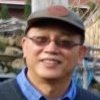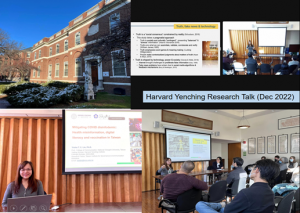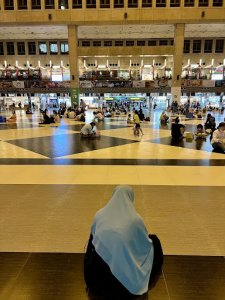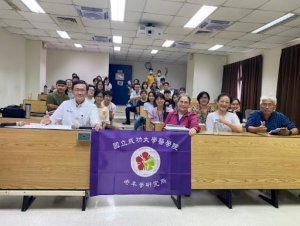I am so lucky and grateful for the opportunity to conduct my Fulbright research in Taiwan. For most of my fellow grantees, Taiwan is a new place. But for me Taiwan is like home. Returning to Taiwan means returning to my cultural roots, for that’s where I was born. Although I have visited Taiwan several times since I left in 1983, this is the first time in 33 years that I was able to have Chinese New Year Eve dinner (nianye fan年夜飯 or tuanyuan fan 團圓飯)with my family. This is also the first time I was able to visit my father and father-in-law’s tombs on the Tomb-Sweeping Day, known in Chinese as the Qingming 清明 Festival. Recently, I attended a high school reunion for the very first time since graduating 40 years ago. Reconnecting with so many classmates and learning about their career paths, I realize all that I missed during Taiwan’s economic heyday of the 1980s and 1990s. Taiwan was then one of Asia’s success stories, and was designated one of the four Asian Dragons 亞州四小龍. I discovered that several of my classmates are listed among Taiwan’s most successful businesspeople.
The changes I see in Taiwan are quite dramatic—from the labor-intensive industry to its emphasis on high-tech and, more recently, the service-oriented business. Taiwan’s economic boom can be attributed in part to the abundant supply of skilled workers and professionals. Over the last few decades, Taiwan’s workforce has experienced a large technology and engineering boom due to implementation of educational and economic policies that emphasize Science, Technology, Engineering, and Mathematics (STEM). This has resulted in a large number of STEM-related degree-holders and a high participation rate in the STEM workforce in Taiwan.
However, overproduction of STEM graduates has also created employment problems. Many people have obtained employment in areas that do not match their academic majors. A preliminary finding from my Fulbright study suggests that only approximately 43% of college students majoring in STEM fields felt certain about their current major while about 41% of STEM students said they would choose the same major if they had the chance to do it over again. These findings suggest that the majority of students are not happy with their choices. While Taiwan has experienced success in STEM industries, many people in Taiwan likely choose to enter STEM careers because of social/cultural expectations or as a default choice instead of pursuing their own interests. Recently, Taiwan has even been experiencing difficulty in retaining the talent pool in the STEM pipeline after graduation. The oversupply of college graduates competing for a much smaller number of available STEM career positions results in lower earnings and high unemployment rate, and causes many to end up settling for jobs completely unrelated to their field of study. Moreover, other talented young professionals these days are now seeking jobs elsewhere, such as China or Singapore. As the number of STEM graduates continues to grow, career guidance and counseling is becoming increasingly crucial.
I am intrigued by Taiwan’s achievement in promoting STEM careers, but also concerned about the many individuals who choose STEM careers only to see a lack of employment opportunities and a mismatch of their interests. It is for this reason that I chose to conduct a study in Taiwan investigating what factors influence high school students to aspire to STEM careers and what factors influence college students to major in STEM field of studies. I especially wanted to find out what barriers and support they receive in their STEM-related pursuits. An understanding of these factors would allow counselors and policy-makers to take a proactive approach to tailoring developmentally appropriate and culturally sensitive career interventions for individuals who are interested in the STEM careers.
Tunghai University is an ideal host institute. Besides being one of the top universities in central Taiwan, it is the only higher education institution that has kindergarten through graduate education programs. The Graduate Institute of Education, my host department, is located in the Tunghai-affiliated high school building. Since my research involves both high school and college students, the location is convenient for conducting my study.
Unlike most of the Fulbright scholars, who began their programs in August, I started in January 2016 with a shorter program lasting 6 months, and it has been a challenge to finish my proposed study in such a short period of time. Upon reflection, a full year program would have been better for a study that involves both qualitative and quantitative research methods. Nevertheless, over the last four months since I started the program I have accomplished the following tasks:
- Interviewed 12 high school students in two focus group sessions.
- Developed a 5-page survey questionnaire, with versions for both high school and college students.
- Milk
- Translated both questionnaires into Chinese with back-translation procedures to ensure the validity and reliability of the questionnaire.
- Pilot-tested the questionnaire with a small sample of students.
- Conducted a test-retest procedure to obtain test-retest reliability of the survey instruments.
- Administered the questionnaires to over 500 high school students in two area schools and 500 college students attending five different universities.
- Presented two research papers at two international conferences, one in Fukuoka and the other in Hong Kong. Although these papers were not entirely based on this Fulbright project, they follow the same line of research I have been pursuing in my research agenda here.
I am currently running data analyses and will begin to report the preliminary findings soon after. The tasks of preparing and cleaning data for analyses have been facilitated by my collaborators at Tunghai, Dr. C.J. Chen and Dr. S.K. Chao. They have also helped me contact the key personnel necessary to conduct my study.
Besides my research project, this Fulbright grant also provides ample opportunities to network and share my knowledge and expertise with others. For instance:
- Shared my research study with faculty and students at Tunghai university (approx. 20 attendees)
- Held a professional workshop on career decision-making for faculty and staff at Da-Yeh university (approx. 30 attendees)
- Taught a career development seminar for graduate students enrolled in the teacher education program (15 students enrolled in this seminar)Presented as keynote speaker at a professional conference to held at Tunghai (over 100 people have registered to attend)
- Talked about my academic career and job search experience in USA to faculty and students at Taiwan Normal University (approximately 30 attendees)
- Presented my research to faculty and students at the University of Hong Kong (approximately 25 attendees).
Opportunities to share expertise are more prevalent in Taiwan than in the US. The Ministry of Education of Taiwan provides incentives to universities that engage in international collaboration and are competitive globally. Inviting foreign scholars to share their knowledge and expertise is highly encouraged. However, in my opinion, there is disparity in attracting scholars among universities. Prestigious universities or universities that are located in urban settings tend to attract more foreign scholars than universities with lower academic rankings or those located in rural areas. These universities mostly are located in northern Taiwan. Since my host institute is located in the central part of Taiwan, I have opportunities to give talks at universities in the Taichung area.
Being able to speak Chinese is definitely an advantage. I have no problem finding my way around, reading menus at restaurants, watching local news, and talking to people at any location in Taiwan. I conduct my research in Chinese and teach my class using a mix of English and Chinese. Though I have spent most of my life in the US, I have been able to clearly communicate my experiences and insights as a “foreigner”, without having to worry about the language barrier. This created a much smoother experience for myself and my Taiwanese colleagues and students.
There is a phrase that is frequently heard in Taiwan: “The most beautiful thing about Taiwan is its people,” People here are often willing to go the extra mile to help you, as I have repeatedly experienced during my Fulbright visit. The staff at the Foreign Scholar Exchange program and my hosts at Tunghai have provided excellent support for me during my stay. I have made many new friends and colleagues with whom I intend to collaborate further after I return to the US.
During my stay, I have taken part in a variety of academic and non-academic activities. I have gained a deeper understanding of Taiwanese culture and education system. I intend to share what have I learned with my colleague and community when I return to my home in the United States.
Post Views: 1,592







